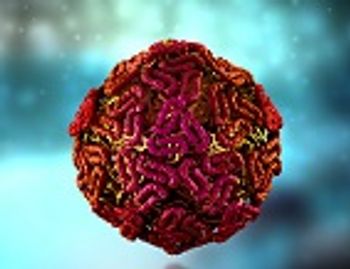
Marion A. Kainer, MD, MPH, FRACP, FSHEA, provides key points to help healthcare providers prevent healthcare associated infections.

Marion A. Kainer, MD, MPH, FRACP, FSHEA, provides key points to help healthcare providers prevent healthcare associated infections.

Michael Calderwood, MD, MPH, previously assistant hospital epidemiologist and associate director of antimicrobial stewardship at Brigham and Women’s Hospital, discusses concerns over antibacterial and antimicrobial central line devices.

Michael Calderwood, MD, MPH, previously assistant hospital epidemiologist and associate director of antimicrobial stewardship at Brigham and Women’s Hospital, discusses healthcare associated infections that special populations, such as those who are immunocompromised, are most susceptible to.

Despite one reported death from West Nile Virus in November 2015, Louisiana health officials report a decline in the occurrence of the mosquito-borne illness.

Jason C. Gallagher, PharmD, FCCP, FIDSA, BCPS, President, Society of Infectious Diseases Pharmacists, provides more information on the Pennsylvania case of mcr-1 E. coli.

Gonzalo Bearman, MD, MPH, hospital epidemiologist, Virginia Commonwealth University, describes the risks of animal to human infection transmission in healthcare settings.

Prof. Andrea Endimiani, MD, PhD, from the Institute of Infectious Diseases at the University of Bern, Switzerland, discusses how practitioners should test for colistin-resistant pathogens.

Michael Calderwood, MD, MPH, previously an assistant hospital epidemiologist and associate director of antimicrobial stewardship at Brigham and Women’s Hospital, discusses how the hospital environment can be dangerous to special population patients.

Abdulla Al-Khan, MD, director of the Division of Maternal-Fetal Medicine and Surgery at Hackensack University Medical Center, discusses how long after exposure to Zika that a woman should wait before undergoing IVF therapy.

On the heels of new data suggesting the Zika epidemic will last for another 3 years, a new case reveals there may be a new mode of zika transmission.

Jeff Boyd, PhD, assistant professor of Biochemistry and Microbiology at Rutgers school of Environmental and Biological Sciences, explains how Staphylococcus aureus and other microbes become antibiotic-resistant.

Abdulla Al-Khan, MD, director of the Division of Maternal-Fetal Medicine and Surgery at Hackensack University Medical Center, describes his learnings from delivering a baby with Zika-related microcephaly.

Pedro Fernando da Costa Vasconcelos, MD, PhD, director of WHO Collaborating Center for Arbovirus and Research, Evandro Chagas Institute, explains how the Zika virus affects fetuses of infected pregnant women.

Prof. Andrea Endimiani, MD, PhD, from the Institute of Infectious Diseases at the University of Bern, Switzerland, explains the method by which bacteria carrying the mcr-1 gene are transmitted between people.

Marion A. Kainer, MD, MPH, FRACP, FSHEA, Director of Healthcare Associated Infections and Antimicrobial Resistance Program, Tennessee Department of Health, warns of the dangers of the most underrated healthcare associated infections, and explains how best to treat them.

Elizabeth Dodds-Ashley, PharmD, MHS, at the Department of Medicine at Duke University School of Medicine, discusses key points to consider when deciding what drug dosage to prescribe to a patient.

Jason C. Gallagher, PharmD, FCCP, FIDSA, BCPS, President, Society of Infectious Diseases Pharmacists, shares what is known about the Pennsylvania superbug case and whether or not others can be infected.

Abdulla Al-Khan, MD, director of the Division of Maternal-Fetal Medicine and Surgery at Hackensack University Medical Center, discusses the prognosis for babies born with Zika-linked microcephaly.

Abdulla Al-Khan, MD, director of the Division of Maternal-Fetal Medicine and Surgery at Hackensack University Medical Center, discusses the medical condition of the tri-state area's first Zika-linked microcephaly baby.

Elizabeth Dodds-Ashley, PharmD, MHS, at the Department of Medicine at Duke University School of Medicine, explains how changes in antimicrobial resistance should be reflected in drug dosage.

Abdulla Al-Khan, MD, director of the Division of Maternal-Fetal Medicine and Surgery at Hackensack University Medical Center, discusses the diagnosis and delivery of the tri-state area’s first Zika-infected microcephaly baby.

Elizabeth Dodds-Ashley, PharmD, MHS, at the Department of Medicine at Duke University School of Medicine, discusses the importance of healthcare providers knowing the differences between pharmacokinetics and pharmacodynamics.

Abdulla Al-Khan, MD, director of the Division of Maternal-Fetal Medicine and Surgery at Hackensack University Medical Center, discusses the length of time during which a mother can pass on a Zika infection to her fetus with Contagion.

Jason C. Gallagher, PharmD, FCCP, FIDSA, BCPS, President, Society of Infectious Diseases Pharmacists, shares his thoughts on the “elephant in the room” with regards to antimicrobial stewardship.

Elizabeth Dodds-Ashley, PharmD, MHS, at the Department of Medicine at Duke University School of Medicine, outlines the differences between Pharmacokinetics and Pharmacodynamics.

Abdulla Al-Khan, MD, director of the Division of Maternal-Fetal Medicine and Surgery at Hackensack University Medical Center, explains whether or not someone can contract the Zika virus from an infected baby.

Jason C. Gallagher, PharmD, FCCP, FIDSA, BCPS, president, Society of Infectious Diseases Pharmacists, explains what healthcare providers need to know about this most recent case of a superbug infection in the US.

Abdulla Al-Khan, MD, director of the Division of Maternal-Fetal Medicine and Surgery at Hackensack University Medical Center, explains the threat of Zika, and when it is most harmful to a fetus.

Jeff Boyd, PhD, assistant professor of Biochemistry and Microbiology at Rutgers School of Environmental and Biological Sciences, explains the difference between Staphylococcus aureus and Methicillin-resistant Staphylococcus aureus.

Abdulla Al-Khan, MD, director of the Division of Maternal-Fetal Medicine and Surgery at Hackensack University Medical Center, describes the diagnosis of the tri-state area's first case of Zika-linked microcephaly in a newborn child.